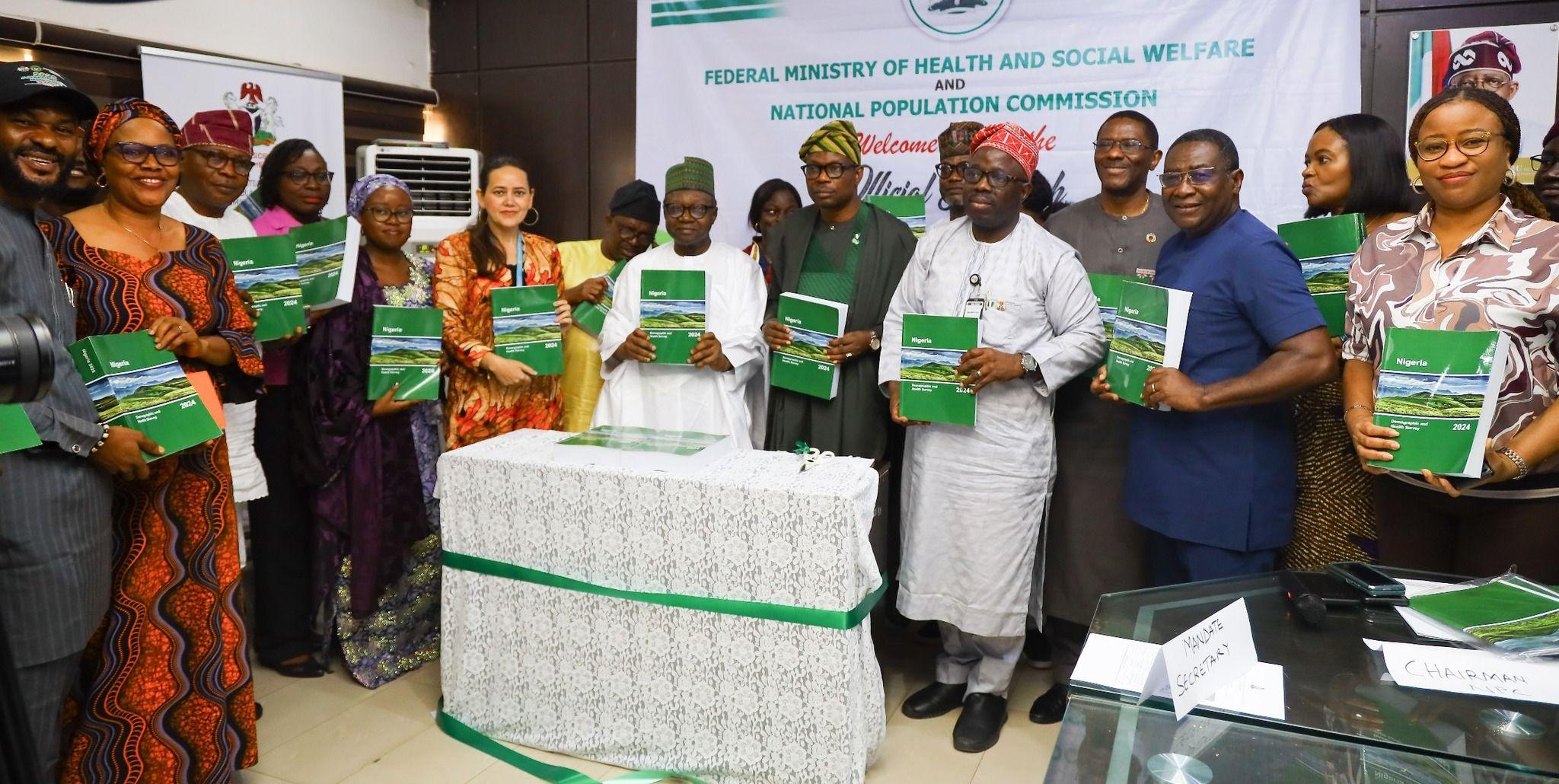
NPC LAUNCHES 2024 DEMOGRAPHIC AND HEALTH SURVEY REPORT, REVEALS NOTABLE GAINS AND PERSISTENT GAPS
October 17, 2025
Admin
The National Population Commission (NPC) has officially launched the 2024 Nigeria Demographic and Health Survey (NDHS) Report, revealing measurable progress in key health indicators alongside persistent challenges requiring urgent attention.
News
The National Population Commission (NPC) has officially launched the 2024 Nigeria Demographic and Health Survey (NDHS) Report, revealing measurable progress in key health indicators alongside persistent challenges requiring urgent attention.
The launch event, held at the Federal Ministry of Health and Social Welfare office in Abuja, today, 17th October 2025, was attended by the Minister of State for Health and Social Welfare, Dr. Iziaq Adekunle Salako, Chairman of NPC, Hon. Nasir Isa Kwarra and representatives from UNICEF, WHO, UNFPA, World Bank, and other development partners.
Speaking at the launch event, NPC Chairman Hon. Kwarra described the NDHS as “a national mirror that reflects how far we have come in improving the health and well-being of Nigerians.” He noted that the survey is vital to understanding population dynamics, fertility rates, nutrition, malaria prevalence, HIV indicators, and maternal and child health trends across the country.
He said that the NDHS is Nigeria’s foremost nationwide demographic assessment, conducted every five years since 1990 to provide reliable data for national planning and monitoring of health policies. The 2023–24 edition, Hon. Kwarra said, was implemented by the National Population Commission with oversight from the Federal Ministry of Health and Social Welfare, and technical support from ICF under The DHS Programme.
According to him, data were collected from over 40,000 households across all 36 states and the Federal Capital Territory, ensuring that the findings accurately reflect both national and subnational realities.
Hon. Kwarra commended the support of international development partners—particularly the United States Agency for International Development (USAID) and the Bill & Melinda Gates Foundation—for their critical roles in sustaining and completing the survey, especially following earlier funding challenges. He emphasized that “the completion of this report demonstrates what is possible when institutions and partners work with a shared vision to strengthen Nigeria’s data systems.”
The NPC Chairman also paid tribute to the technical teams from the Commission, the Federal Ministry of Health, and partner agencies for their professionalism and dedication in delivering a report that meets “the highest international standards of accuracy and integrity.”
Hon. Kwarra urged government agencies, policymakers, researchers, and development partners to put the data to practical use—informing reforms, improving service delivery, and guiding investment in population and health programmes.
In his address, the Minister of State for Health, Dr. Salako commended all stakeholders across the health and related sectors for their collaboration in producing the nationally representative, population-based survey. He emphasized that the NDHS remains a critical tool for tracking Nigeria’s health progress and guiding action toward achieving both national and international development commitments.
He said that according to the 2024 NDHS, Nigeria has recorded a decline in Total Fertility Rate from 5.3 children per woman in 2018 to 4.8 children in 2024, reflecting gradual improvement in access to and use of family planning services. He said that the use of modern contraceptives among married women rose modestly from 12% in 2018 to 15% in 2023, while the satisfied demand for family planning increased to 37%.
“These improvements are important,” Dr. Salako noted, “but remain well below the levels we need to secure rapid social and economic gains.”
In terms of maternal and child health, antenatal care coverage stands at 63%, while delivery by skilled providers reached 46%. Postnatal care within two days of delivery increased from 38% in 2018 to 42% in 2024, though many births still occur without skilled assistance.
The report highlights substantial progress in reducing child mortality. The under-five mortality rate dropped from 132 deaths per 1,000 live births in 2018 to 110 deaths per 1,000 live births in 2024, indicating a significant improvement. However, neonatal mortality has remained relatively stagnant, moving from 39 deaths per 1,000 live births to 41 deaths per 1,000 live births, prompting calls for intensified action on newborn health.
Despite some gains, the survey points to continuing challenges in immunization coverage. Only about 39% of children aged 12–23 months received all basic antigens, and 20% were fully immunized. Ownership of insecticide-treated nets (ITNs) remains widespread, with nearly 60% of households owning at least one net, and use among pregnant women has improved to around half of those surveyed — an encouraging sign for malaria prevention and child survival.
Dr. Salako stressed that the findings from the NDHS would inform evidence-based policy decisions and programmatic actions. “These findings will be translated into policy change and program action. We will continue to strengthen the health system across all levels to address the noted gaps for better health outcomes,” he said.
He commended National Population Commission for its leadership in implementing the survey and acknowledged the contributions of partners including USAID, UNFPA, UNICEF, The Global Fund, World Bank, Bill & Melinda Gates Foundation, WHO, FCDO, academic institutions, NBS, and other development partners.
Director-General of NPC, Dr. Osifo Tellson Ojogun presented the Key Findings from the 2024 NDHS before the main Report was officially launched and unveiled by the Honourable Minister of State for Health and other dignitaries.
The NDHS remains one of the most significant tools in Nigeria’s demographic and health data architecture, providing the evidence base for the nation’s drive toward sustainable development and improved quality of life.
